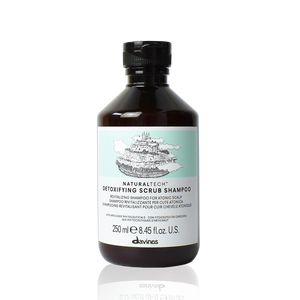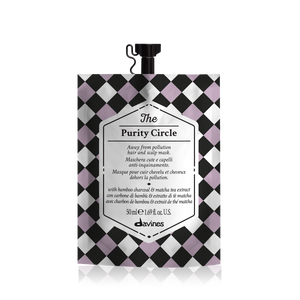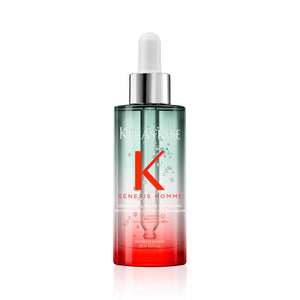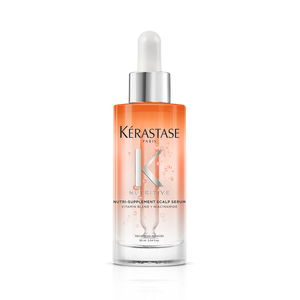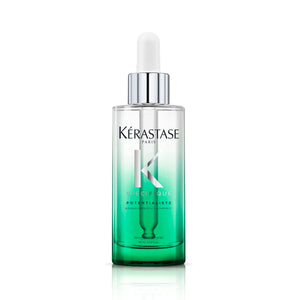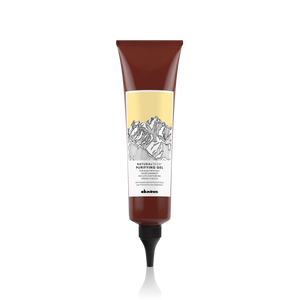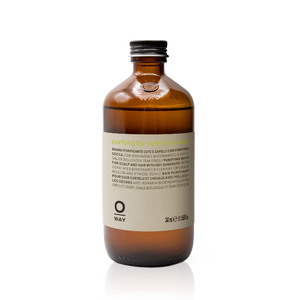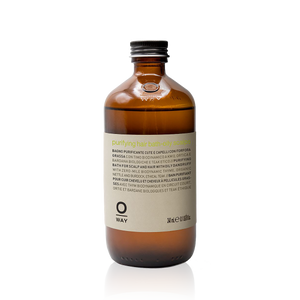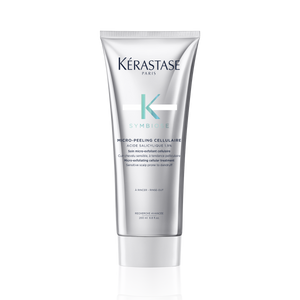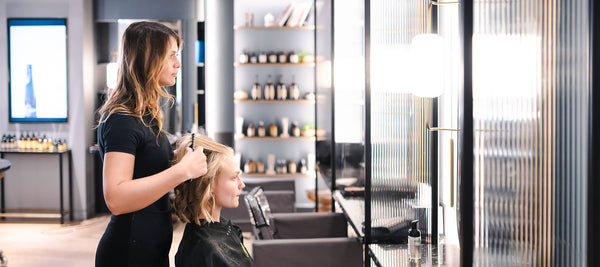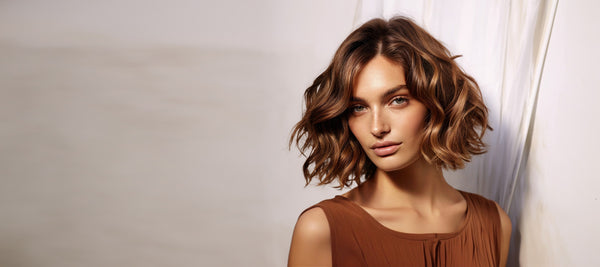The secret to healthier hair: Why scalp care matters
Caring for your hair is like looking after a garden.
That may seem like an unusual analogy, but it makes sense if you think of your strands as the plants and your scalp as the soil.
"If you had plants in unhealthy soil the plants wouldn't grow well - it's the same for your scalp and hair," says Matilda Marshall, director at Paul Edmonds London.
"Any internal factors affecting your scalp will in turn affect your hair, so trying to balance out your scalp will ensure healthy hair growth."
The main factors influencing scalp health are hormone and vitamin levels. While you'll need to talk to your doctor about underlying causes, your hairdresser can assess any scalp issues caused by these factors and recommend products to counteract them.
"With every client who comes in, one of the first questions I ask before getting the hair shampooed is, 'Do you have any scalp sensitivities or concerns?'" Matilda says.
"I always check the scalp thoroughly, especially behind the ears and through the back of the hair because a client might not know they have, for example, some dry scalp build-up in the back."
Recently, a new wave of skincare-inspired scalp products has landed on the beauty scene, making it easy to optimise the health of your scalp and, by extension, your hair.
Here, Matilda talks through everything you need to know about taking care of your scalp…
How can you tell if your scalp is healthy?
The main way to determine if your scalp is healthy is to take note of any changes to how the skin and hair look and feel.
"If you suddenly have a lot of hair shedding that can be a sign of a scalp issue," Matilda says. "On the other hand, a lot of new hair growth - if you notice baby hairs coming through - can sometimes show that there's been a problem."
Pay attention to if your scalp feels more itchy or sensitive than normal or if there is any flakiness or dandruff (more on that topic later). On the other hand, if your hair is more oily than usual that could be a reaction to an underlying issue.
"Sebum (oil) is produced as a barrier for your scalp so if suddenly your hair is getting oilier than usual it's likely that your scalp is trying to produce a barrier against some external factors," Matilda explains.
For women, hormone changes, for example due to menopause, can lead to changes in the scalp: "Over time, women's collagen levels drop a lot quicker than men's. On the scalp, collagen can harden which can cause hair follicles to become blocked."
It's also important to remember that men's hair shedding can be a sign of a scalp problem, Matilda points out: "I think we sometimes assume that men lose their hair and put it down to male pattern baldness, but actually it could be something else causing it. The way to identify male pattern baldness is that thinning usually starts from the recessions or the crown, rather than general hair shedding across the scalp."

How can you maintain a healthy scalp?
Healthy hair starts with a healthy scalp. To create the best conditions for gorgeous, glossy locks, treat your scalp as you would your face.
"You should be exfoliating your scalp once a week with a scalp scrub," Matilda says. "I like the Davines Solu Sea Salt Scrub Cleanser and the Purity Circle Detoxifying Hair Mask, which has nice purifying properties to help detoxify and cleanse the scalp."
"If you had dry skin on your face you would be treating it with moisturiser - for the same reason you should moisturise a dry scalp," Matilda continues.
"You can do that with nourishing scalp serum drops. A lot of the scalp serums contain hyaluronic acid as you would put on your face."
Kérastase has a range of scalp serums to address different concerns, including Genesis to prevent hair shedding and Nutritive with hydrating niacinamide.
Matilda recommends Potentialiste for promoting healthy hair growth: "It helps to ensure you've got a balanced microbiome, meaning healthy bacteria on the scalp. It's similar to the probiotics you take for gut health."
Make sure to follow the directions as some scalp serums are used as temporary treatment while others can be used continuously.
The other important thing to remember is to be gentle with your scalp, whether you're shampooing, applying a scrub or brushing.
"People sometimes think that as soon as you've got any kind of oiliness or dryness you should really scrub it to get it off, but actually that can overstimulate your scalp so it can make it produce more oil," Matilda says.
"Try to be soft and gentle with your scalp. If you've got oily hair you should be lathering your shampoo slowly and not using very hot water either, as that can overstimulate the scalp as well."
Can scalp care treat dandruff?
To get rid of dandruff, you first need to understand what causes it and which type you have.
"We have healthy bacteria living on our scalp, including a type called Malassezia globosa," explains Matilda. "Dandruff is when your Malassezia globosa goes into overdrive and you're producing skin on your scalp so fast that you can't remove the old skin quick enough."
There are two types of dandruff, oily and dry: "Oily dandruff is usually yellowy flakes, it feels quite sticky and it can be a little bit smelly. Dry dandruff is more like a white coating on the scalp that's flaky."
Your hairdresser can help you identify which type you have and recommend a suitable anti-dandruff shampoo or determine if you should see a doctor about a medicated treatment.
"I really like the Davines Naturaltech Purifying Gel Treatment," Matilda says. "Oway has dandruff treatments for oily and dry hair, and Kérastase has the Symbiose treatment with a high level of salicylic acid that helps to remove dead skin and slow down the level of Malassezia globosa."
How can a scalp treatment help?
Paul Edmonds London is currently trialing a tricho camera, a special type of magnifying camera that allows our hairdressers to look closely at the scalp. When you book have a Scalp Detox Treatment, your stylist will start by using the tricho camera to identify any problems.
"We can see if you're having hair fall, if you've got blocked follicles or if your collagen is hardening and constricting the follicles," Matilda explains.
"We tailor the treatment around the client's concerns. I usually use an Oway treatment product to tackle things like sensitivity, dandruff or an oily scalp, then I will look again on the camera to see the before and after effect."
The treatment, which lasts around 45 minutes, finishes with a wash.
If scalp issues persist after you've tried salon treatments and at-home products, it may be time to see a doctor, Matilda adds: "A GP can check your hormone levels or carry out other blood tests and they can prescribe medication if necessary."
Skin in the game
As beauty buffs will tell you, you should never neglect your skincare routine, and the same goes for your scalp. To create the best conditions for hair growth, add an exfoliating scrub and moisturising serum to your usual haircare product line-up.
If you're concerned about scalp issues such as dandruff, dryness, oiliness or itching, talk to you hairdresser, who can assess the symptoms and suggest treatment products or recommend if you should seek medical help.

Our soothing Scalp Detox Treatment is like a facial for your scalp. Book yours at Paul Edmonds London.

